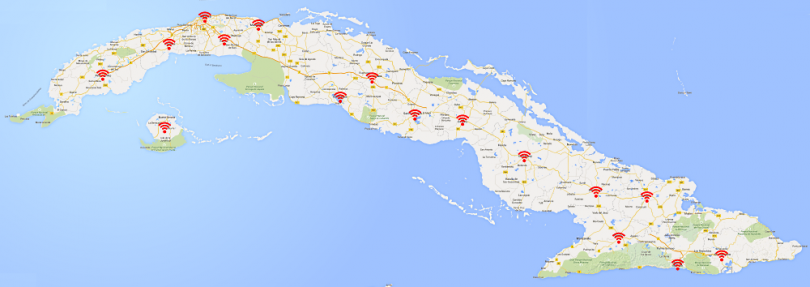aNewDomain — The presentation was called “A society on the road to informatization.” But the point was what Internet competition will look like as international connectivity services roll out in this island nation.
— The presentation was called “A society on the road to informatization.” But the point was what Internet competition will look like as international connectivity services roll out in this island nation.
Here are some of the concrete points made during the discussion, which was held here in Cuba last month.
There are 746 ATMs in the nation, and in 53 or 168 municipalities, said Wilfredo Gonzalez Vidal, who is Cuba’s Vice Minister of Communication.
Mayra Arevich Marin, chief executive of ETECSA, noted that connection speeds to institutions of higher education have increased from 10-34 MBps, which sheds light on university connectivity.
She also said there are now 683 public access points in Cuba, counting navigation rooms.
And Marin noted that the government will add more WiFi access points this year, but she did not note how many, or where.
Reynaldo Rosado, vice president of the University of Information Science, discussed students. He noted that 128 software and service projects are being developed currently, and that 13,500 young people have graduated from UCI.
Anamaris Solórzano Chacón, national director of institutional communication for the Youth Computer Club, talked about telecommunication projects. Contenidos Unificados de Búsqueda Avanzada (CUBA), the Cuban search engine, was launched in July 2015.
Ecured, which was launched in December 2010, has more than 140,000 items and 200,000 hits daily. (It is also distributed on DVD and flash.) Likewise, Cacón said that the Reflejos blog platform now has 6,500 blogs and over 5,000 visits a day.
Do what you do best — and link to the rest
For me, the most interesting statement was by Anamaris Solórzano Chacón. When speaking of the CUBA search engine, she said it was part of an effort to reduce dependence on foreign applications.
As long as very few Cubans have access to the international Internet, it makes sense to offer their own services on the domestic intranet. But, if Cuba opens to the international Internet, as they say they will, their local services will be redundant and unable to scale and compete. Ecured will never be Wikipedia, Reflejos will never be Blogger and CUBA will never even be Bing, let alone Google Search.
China is large enough that, for political and economic reasons, it can sustain domestic versions of popular Internet services, but Cuba is not.
I understand and admire the desire to be self-sufficient, but it really isn’t feasible in this case. As the saying goes — “do what you do best and link to the rest.” It should invest in uniquely Cuban services.
For aNewDomain, I’m Larry Press.
Ed: A version of this article appeared on Larry Press’ laredcubana. Read it here.
Images in order: Map of Cuba by Larry Press; Screenshot of round table panel; Screenshot courtesy CUBA













